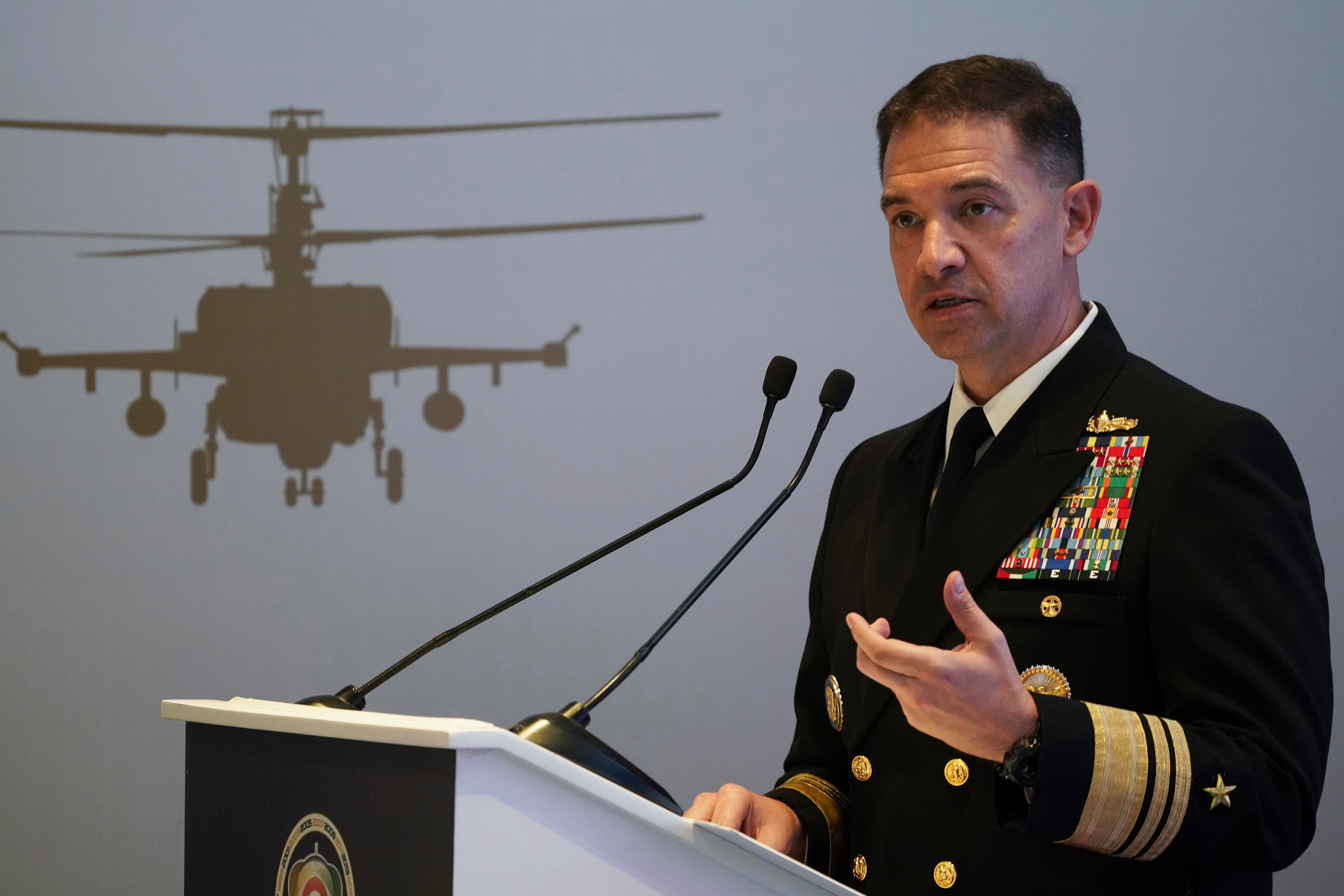Iran is 'directly involved' in Yemen Houthi rebel ship attacks, US Navy's Mideast chief tells AP
The U.S. Navy’s top Mideast commander says Iran is “very directly involved” in ship attacks by Yemen’s Houthi rebels during Israel’s war against Hamas

Iran is “very directly involved” in ship attacks that Yemen's Houthi rebels have carried out during Israel's war against Hamas, the U.S. Navy's top Mideast commander told The Associated Press on Monday.
Vice Adm. Brad Cooper, the head of the Navy's 5th Fleet, stopped short of saying Tehran directed individual attacks by the Houthis in the Red Sea and the Gulf of Aden.
However, Cooper acknowledged that attacks associated with Iran have expanded from previously threatening just the Persian Gulf and its Strait of Hormuz into waters across the wider Middle East.
"Clearly, the Houthi actions, probably in terms of their attacks on merchant shipping, are the most significant that we’ve seen in two generations,”he told the AP in a telephone interview. “The facts simply are that they’re attacking the international community; thus, the international response I think you’ve seen.”
Iran's mission to the United Nations did not immediately respond to a request for comment on Cooper's remarks. Houthi leadership in Yemen's capital, Sanaa, could not be immediately reached.
Since November, the Iranian-backed Houthis have launched at least 34 attacks on shipping through the waterways leading up to Egypt's Suez Canal, a vital route for energy and cargo coming from Asia and the Middle East onward to Europe.
The Houthis, a Shiite rebel group that's held Sanaa since 2014 and been at war with a Saudi-led coalition backing Yemen's exiled government since 2015, link their attacks to the Israel-Hamas war. However, the ships they've targeted increasingly have tenuous links to Israel — or none at all.
In recent days, the U.S. has launched seven rounds of airstrikes on Houthi military sites, targeting air bases under the rebels' control and suspected missile launch sites. The tempo of Houthi attacks on shipping appears to have slowed for the time being as the U.S. and its allies have increased their naval patrols in the region.
However, risks for the global economy remain as many ships continue to bypass that route for a longer trip around Africa's southern tip. That's meant lower revenue for Egypt through the Suez Canal, a vital source of hard currency for the country's troubled economy, as well as higher costs for shipping that could push up global inflation.
As Cooper took command of the 5th Fleet in 2021, the threat to shipping focused primarily around the Persian Gulf and its narrow mouth, the Strait of Hormuz, through which a fifth of all oil traded passes. A series of attacks blamed on Iran and ship seizures by Tehran followed the collapse of Iran's nuclear deal with world powers.
In his interview with the AP, the Navy commander acknowledged the threat from Iran's proxies and that its distribution of weapons extended from the Red Sea out to the far reaches of the Indian Ocean. The U.S. has blamed Iran for recent drone attacks on shipping, and a U.S.-owned cargo vessel came under attack from the Houthis in the Gulf of Aden last week.
So far, Iran has not directly gotten involved in fighting either Israel or the U.S. since the war in Gaza began on Oct. 7. However, Cooper maintained Iran had been directly fueling the Houthi attacks on shipping.
“What I’ll say is Iran is clearly funding, they’re resourcing, they are supplying and they’re providing training," Cooper said. "They’re obviously very directly involved. There’s no secret there.”
Cooper described the ship attacks striking the Mideast as the worst since the so-called Tanker War of the 1980s. It culminated in a one-day naval battle between Washington and Tehran, and also saw America accidentally shoot down an Iranian passenger jet, killing 290 people.
Back then, American naval ships escorted reflagged Kuwaiti oil tankers through the Persian Gulf and the strait after Iranian mines damaged vessels in the region. Cooper said authorities had no current plans to reflag ships and escort them past Yemen.
Instead, the U.S. and its allies employ a “zone defense, and every once and a while we shift to a one-on-one,” he said.
Cooper's reference to the tensions from more than three decades ago underlines just how precarious the situation in the wider Mideast has become as worries of a regional conflict over the Israel-Hamas war grow.
He spoke to the AP from the sidelines of a drone conference in Abu Dhabi, the capital of the United Arab Emirates. Under his command of the 5th Fleet, the naval force has created Task Force 59, a drone fleet to bolster its patrol of waterways in the region.
Today, a variety of drones provide the 5th Fleet coverage across some 10,000 square miles (25,900 square kilometers) of Mideast waters the Navy otherwise wouldn't have eyes on, Cooper said. That helps its efforts to interdict suspected drug and weapons shipments.
U.S. forces this month seized Iranian-made missile parts and other weaponry from a ship bound for the Houthis in a raid that saw two Navy SEALs go missing. The U.S. military's Central Command said Sunday it now believes the SEALs are dead.
While not directly saying his fleet's drones played a part in the seizure, Cooper hinted at it.
"They are specifically designed to conduct interdiction operations,” he said. He added: “There’s no squeaking anything by it.”
Cooper’s command is set to end in February with the upcoming arrival of Rear Adm. George Wikoff in Bahrain. He noted the Navy and merchant shippers still face a serious threat from the Houthis as he prepares to leave.
“What we need is a Houthi decision to stop attacking international merchant ships. Period,” Cooper said.